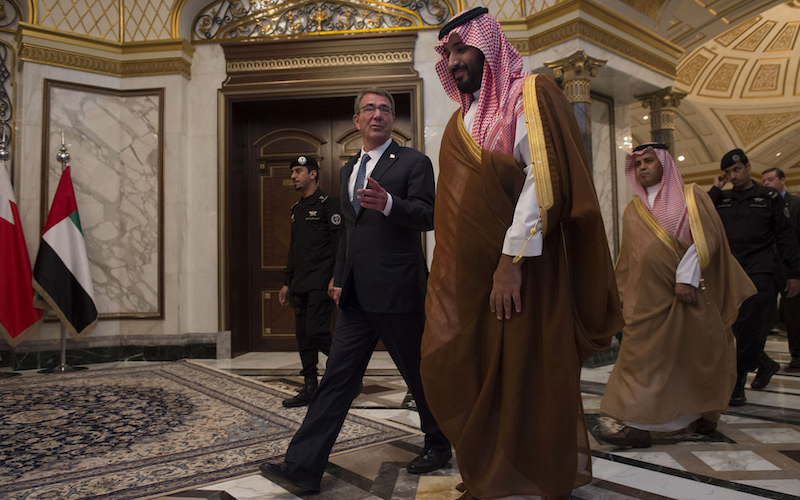
Mohammad Bin Salman Named Saudi Arabia’s Crown Prince: The Saudi Chess Move
The appointment of Crown Prince Mohammad bin Salman as the next heir to the Saudi throne has garnered a mixed reaction from the global community. The approval of this appointment came from “the decision by King Salman to promote his son and consolidate his power [that] was endorsed by 31 out of 34 members of the Allegiance Council.” Meanwhile, the young prince will continue to hold his post as defense minister. What is interesting about the new crown prince is the fact that he will be the first member of the Saudi royal family who could become the next king who is not a son of the founder Ibn Saud, who established the Kingdom of Saudi Arabia in 1932.
On the one hand, the minister of defense is only thirty-one years old. MBS is a young dynamic intellectual for Saudi Arabia’s youth population, he has committed Riyadh to the vision 2030 project which allows for Saudi Arabia to look for alternative sources of energy rather than being dependent on an oil-based economy, and he has a pragmatic vision for the Kingdom of Saudi Arabia that focuses on development and economic prosperity.
On the other hand, you have the critics. One of the main criticisms of Mohammad bin Salman comes on the foreign policy front. Saudi Arabia’s reported funding of terrorist proxies like Boko Haram, the Islamic State, Al-Nusra, Ahrar Al-Sham, and Al-Qaeda in the Arabian Peninsula through the state-sponsored religion of Wahhabism, have been the root cause of sectarianism in the Middle East. In addition, Mohammad bin Salman was instrumental in the genocide in Yemen that has taken the lives of innocent Yemenis. In addition Saudi Arabia’s failure to retake the capital city of Sana’a from the Houthis has created a humanitarian and cholera catastrophe in the region’s poorest country with a GDP below $2,500.
Bin Salman has also been instrumental in the current Qatar crisis which is, in some measures, an ego battle or an old rivalry between Riyadh and Doha. The young Saudi royal was also a champion for high oil production, even though prices were plummeting in the Saudi oil war with Russia and Iran, in which Saudi Arabia eventually blinked and signed an agreement to raise prices with Russia when bin-Salman visited the Kremlin a few weeks ago. What is even more worrying is Mohammad bin-Salman’s hawkish approach to Iran stoking the geopolitical battle for Sunni-Shia hegemony which continues in an already confusing region.
The power struggle can be analyzed as a game of thrones shake-up, but given the landslide vote in favor of the appointment of Mohammad bin Salman as the next successor, he still has strong support from the people of Saudi Arabia and the Saudi royal family.
What does the shake-up mean for the region?
The handover of power to Mohammad bin-Salman marks a new generation for the Kingdom of Saudi Arabia. For Riyadh, on the one hand, you have a young leader who does not have a whole lot of experience, but on the other hand, he is viewed as the ‘Mr. Everything,’ who is popular with the royal family and the younger generation of ordinary Saudis who are tired of the old generation. In fact, according to Fawaz Gerges, a professor at the London School of Economics, Mohammad Bin Salman’s new vision, “appeals to many young Saudis, who see in him an image of themselves. If you travel in the kingdom, his image is everywhere.”
When it comes to foreign policy, one of Riyadh’s main concerns is Iran. Saudi Arabia’s geopolitical ambitions concerning this topic make its goals very worrisome not only for Iran, but for the whole region. The fact that the young prince called for the KSA to “take the battle to Iran” and the fact that he ruled out any dialogue with Tehran, is a severe concern that the shadow Sunni-Shia divide will only continue to plague the Middle East. This shadow proxy conflict between the juggernauts is nothing new and it has been going on for 1,400 years. Both Riyadh and Tehran back opposite sides in the Iraq/Syria conflicts, the Yemen War, and even in Bahrain where social unrest has caused massive concerns in the Persian Gulf. Even Qatar’s close ties with Iran have caused a great amount of skepticism in Riyadh. It would be foolish for Saudi Arabia to take on Iran, with both Tehran and Riyadh needing to curb their expansionist views in the Middle East that is tearing the region apart. With bin Salman’s aggressive approach towards Tehran that is aligned with President Trump’s hardline approach, this will be unlikely to happen.
The United States-Saudi relationship is also something to take into consideration. This old alliance goes back to the 1930’s when oil was discovered in the Persian Gulf, and the close ties in geopolitical intelligence cooperation remain between Washington and Riyadh. But given the current landscape, maybe the relationship with Riyadh is something that needs to be examined by Congress given Saudi Arabia’s extremely difficult, yet ambitious goals. Last month, President Trump signed a series of arms deals that totaled $110 billion with the Saudis when bin-Salman visited Washington. In addition, this deal includes the exchange of tanks, planes, missile defense systems, and cybersecurity technology. The talk in Washington has always been about Iran’s hegemonic views, but Saudi Arabia must change its behavior as well. Given the strong ties of the Riyadh-Washington axis and the hawkish approach from the Trump Administration towards Iran, the U.S will continue to align with Saudi Arabia, so there will be no stability in the Middle East if the U.S takes a side in the sectarianism that is going on in the region.
A Glimmer of Hope?
With the new crown prince appointed, the question becomes are we going to see Saudi Arabia reform its repressive human rights record through domestic reforms for the younger generations and fix their own domestic terrorist problem or are we going to see a reckless Saudi Arabia that continues to contribute as a cancer to the ongoing problems in the region? We don’t know the answer to this question, but so far, it seems like Riyadh’s erratic foreign policy throughout the region has continued through funding radical proxies, buying western arms that are killing thousands of innocents, and bullying their neighbors in Qatar, Bahrain, and Yemen.
There is, at least, some hope for domestic reform in Saudi Arabia. MBS has garnered a lot of popularity amongst the youth, and he wants to legislate a more modern approach towards the Sunni kingdom’s strict approach of Islam into something that is compatible with reform. Vision 2030 can play a huge role in Saudi Arabia’s relationships with the world. The cracking down on domestic terrorism starts at home for Riyadh, and given the fact that Saudi Arabia is the birthplace of Wahhabism, a puritanical movement that has nothing to do with mainstream Islam, MBS has also committed to reducing Saudi Arabia’s funding to radical proxies in the region. The difficulty in this is convincing the religious administration to turn passive support into active support. In addition, MBS has pushed for the kingdom to be more open to entertainment, and hopefully, his vision will allow women to work in certain fields like science and technology, and allow more foreign direct investment to come into the kingdom by collaborating with fellow Gulf States and the world.

